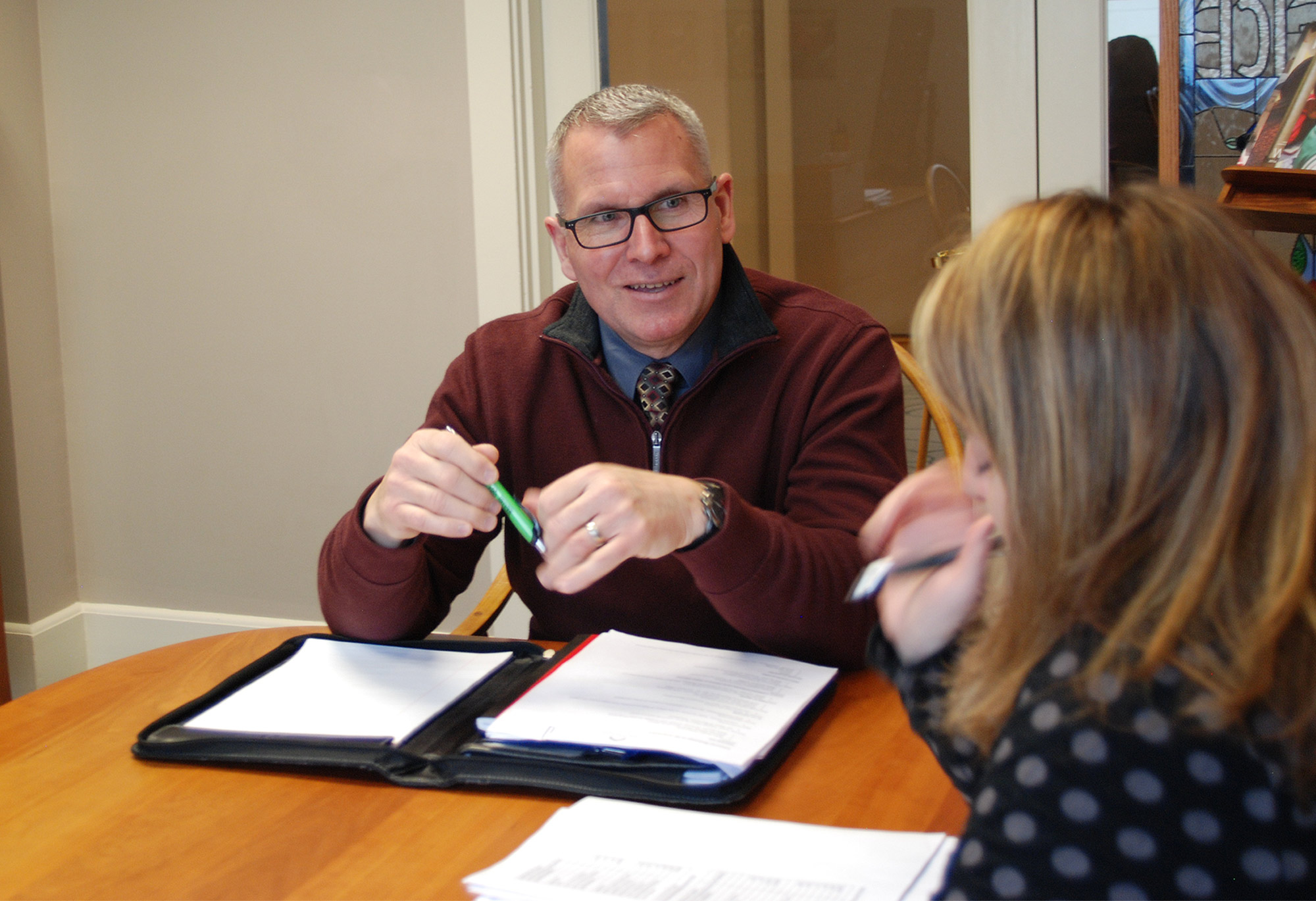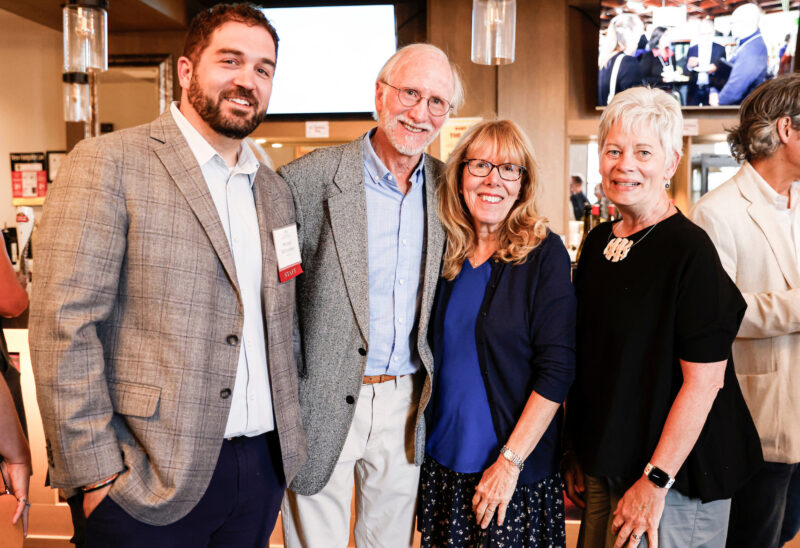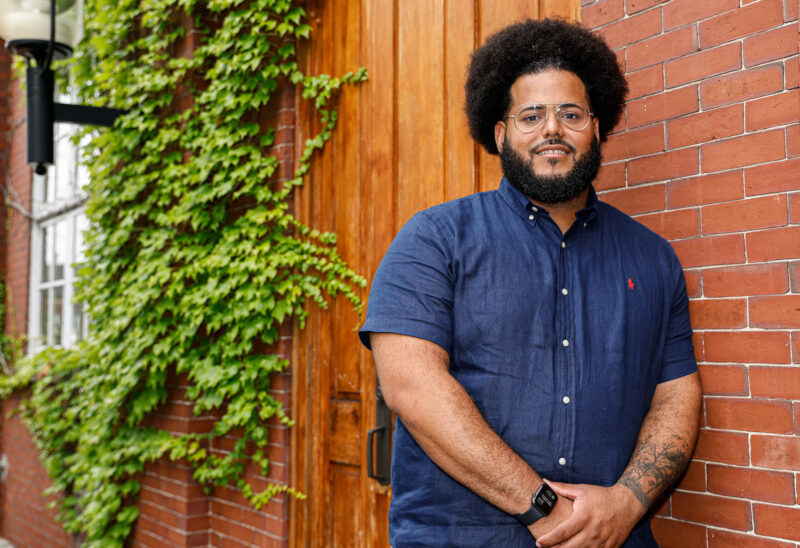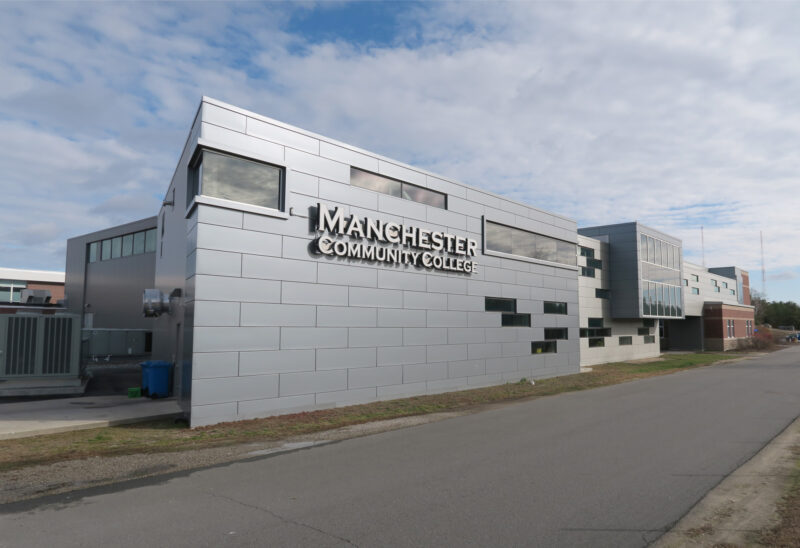Michael Turmelle joined the Foundation in January as director of education and career initiatives. He will be working with partners in education, business, government and the nonprofit sector to advance and help coordinate efforts for “65 by 25” — the shared goal that 65 percent of the New Hampshire adults will have a high-value degree or credential by 2025. Michael’s position is a key part of the Foundation’s New Hampshire Tomorrow initiative to increase opportunities for young people in need.
Michael worked in public education in New Hampshire for 20 years — as a classroom teacher, principal, and assistant superintendent of schools. He has been a key leader in New Hampshire’s move to competency-based education, and has worked closely with students, staff and parents to prepare students for success in communities and careers. He lives with his wife Deidra in Newmarket.
Michael talked with the Foundation’s Lois Shea about his goals for the work, the tennis coach who inspired him to become a teacher, and lessons learned from a chocolate lab named Moxie.
You have spent your career working in education. I am fascinated by the different experiences that people bring to community foundation work. Tell me about why you felt this was the right next chapter in your life’s work.
In the field of education, I have held a lot of different positions…but I have found myself to always be really super-focused on kids who struggle. Working in the classroom, you can clearly see the haves and the have-nots. Sometimes it is clearly visible in the way that the kids are dressed when they come to school, or you see kids who can’t afford to go on the field trip that you’re running, so you’re looking to find scholarships for them, or you’re dealing with kids who have had adverse childhood experiences…
Part of it also is that my wife, Deidra, has been a reading specialist for 34 years and so my vision has been colored by her experience working with kids who struggle to read.
So when this position was announced, the more I read about how the Foundation was focused on equity…that was the light bulb for me. I started reading about the mission of the Foundation and the goals, and reading about New Hampshire Tomorrow…I thought ‘Wow, this is exactly the kind of work that I am trying to do in schools and school districts on a small scale, and how awesome would it be to think that maybe some of my skills could be used to have an influence on a broader scale, in the larger community of New Hampshire?’ That lit a fire for me.
In terms of workforce development and the opportunity gap, it seems like there is a really sweet spot at the intersection of those two things…where we could actually solve the workforce crisis by giving kids who most need it access to opportunity.
I agree.
Part of the issue that folks don’t understand, if they have not been on the ground working with kids, is the barriers that some of our kids face.
If I had a nickel for every time a parent said to me in a meeting: ‘Stop talking to my kid about college. He’s not going to college…’ So there are barriers at home.
I’ve seen situations where a student has a high desire to go on to, say, a two-year program, but the current reality is the student is leaving high school at 2:15 in the afternoon and going and working a full-time job until 11 at night because the family needs the money just for subsistence. And you could give that student all the scholarship money in the world to pay for tuition for college — but unless that student has some mechanism to earn money or assist them with basic daily needs, that is not a reality for that student.
I would like to really see if we can overcome some of those barriers.
How do you begin to do that? What levers do you pull?
I think about a wraparound approach.
Here are just a few things I think that make a big difference: There has been a lot of research around first-generation college-bound students and the importance of connecting their parents to the institution. If a first-generation college student wants to go to a community college, the most important factor is getting a student’s parents on campus — in an ongoing, meaningful way — so that parents can put into their worldview some understanding of what that institution is like. So that is something that can be explored.
Another huge barrier that we don’t anticipate is transportation. As a student, I could have a scholarship, you might even connect me with a job on campus or an internship. But if I can’t get there, I’m in trouble. So I think about programs where we could take first-generation, under-served populations and bring them onto campus during their senior year in high school, on a bus, to earn dual-enrollment credits. And if we could connect those students then with a paid internship in the field that they are studying, that could help meet their subsistence needs.
I think doing it while they are in high school removes some of that uncertainty on part of parents.
So Governor Sununu’s new “Career Academies” proposal sounds like it might have a similar structure to that…?
Yes, it’s based on a really groundbreaking model that seems to be working well in Rochester — and that shows what can happen when school districts, community colleges, businesses, philanthropy and others work together. We are interested in learning more about the proposal and potential ways to scale the approach statewide.
What are the key opportunities that you see for New Hampshire right now in terms of the work that you are doing?
I think the biggest opportunity is the fact that people are ready to mobilize. So many people are interested in this topic. Regardless of where I travel and whom I have spoken with, there is a hyper-focus now on workforce and what it means to be college- and career-ready. That is a great strength.
There is great work happening on these issues around the state, with nonprofits, in education, with businesses, in the public sector. Everybody has great motives, and everybody has the highest regard for the work, and there is a huge opportunity to coordinate and align the efforts.
In New Hampshire, we really do start from a place of strength. We’re small, so it really is possible move the needle on an issue, and the places of need are pretty evident.
Yes. There is also a philosophical proximity here. When I was in the education world, I always felt that, if I wanted to drive to Concord and go to the commissioner of education’s office, the commissioner would see me. That level of access and proximity is also an advantage for us.
What inspired you to be an educator?
When I was in high school, I had a tennis coach and a math teacher named Ray Lambert.
He recruited me to play on the tennis team. And over the course of those four years I would play tennis with Ray four or five times a week all year, even in the winter. He would drive from his home in Rochester and pick me up in Somersworth and we would drive to Newmarket to the Great Bay Racquet Club. He was a tremendous influence on my life. He spent so much of his time helping to develop me in terms of my athletic skills – but that wasn’t really it: He taught me about integrity and character and how to conduct yourself.
So at the end of my four years of college, I thought ‘I really have this desire to go back and get my graduate degree and become and educator.’ And that my life’s mission would be to find one person in the classroom, or on the playing field, that I could have the same positive effect and impact as Ray had on me. And the sad thing about that story was I never told Ray until about 20 years later. I called him when my doubles partner from high school passed away. And he asked what I was doing, and I told him I was the principal of a high school. And he said ‘I never thought you would go into education. What made you go that way?’ And I told him that he was my inspiration.
And the really cool ending to that story is that Ray and his wife had tried to have children for many years. They had adopted a daughter named Kristen. And then his wife became pregnant. And Ray was telling me about his son, that day on the phone, and I asked him what his son’s name was. And he said ‘his name is Michael.’ Ray had named his son after me, and I had changed the whole trajectory of my life because of him. And we had never expressed that to each other. I am mad at myself for waiting 20 years to tell Ray.
It sounds like you never wavered in your career trajectory.
I never saw myself outside of the classroom. That was one thing that has taken me by surprise.
What do you miss about the classroom?
The day-to-day interactions with kids.
Your wife is still in the classroom?
Yes. She is at the North Hampton School, which is a K-8 school. She has made a world of difference for kids and for adults she has worked with to help them become better readers — and to become readers at all. We actually met when we were both teachers at John Stark Regional High School. She was the reading specialist and I was a social studies teacher.
You’re both from New Hampshire?
We are. Deidra grew up in Hancock and I grew up in Somersworth.
So why do you continue to choose New Hampshire as home?
I lived for a short time just outside of San Francisco. My first job out of college was managing a hotel in Ogunquit, Maine.
When I went to graduate school, I wanted to move away. And within about a month, I knew I was going to come back to New Hampshire. The sense of community, the small towns, my family is all here. I love the geography, the mountains, the ocean, the lakes, knowing you can get in the car and be in Boston in an hour.
What do you guys like to do when you’re not working?
We have a family home that has been handed down through three generations in mid-coast Maine that is now in the care of Deidra and me, and we spend a lot of our free time in Maine. And we love to be outdoors. We are both bicyclists. We like to be out riding out bikes and we like to be out in our kayaks and we are both voracious readers.
I always ask people to tell me something people wouldn’t know from reading their LinkedIn profile.
I will encapsulate this with a picture.

This is my friend Moxie, who is a chocolate lab. Moxie was an amazing dog. We lost him in March. He was a rescue and he came to us small for his age and he had severe epilepsy. He lived to be 14…but he required constant care, medication every 12 hours. So we had to schedule our lives around that. I learned so much about compassion and empathy. We don’t have children. We met relatively later in life, and were not blessed with the opportunity to have kids. So I didn’t have those lessons about sacrificing your own personal agenda to take care of another. I learned so much from having him as my best buddy.
That, and I ride a motorcycle. I have since I was 17.
So how do you hope that the work you are doing here at the Foundation will change things for that student you talked about earlier – who could not afford the field trip, whose parents were not encouraging her to go to college? Talk to me about how you envision her life being different as the result of what we’re doing here.
For many generations now, we have been in this upward trajectory where we have been able to expect that kids in the next generation will have a better life. And this generation, now, is the first generation not on target to meet that goal. But I still believe that education is the great equalizer. So first and foremost, that young girl would see that she has prospects. The barriers in front of her will have been removed or at least in some ways lessened, and she will see that she has a real pathway to an education and a career that she wants and that is going to have some longevity in our economy.













![Rev. Heidi Carrington Heath joined Seacoast Outright. [Photo by Cheryl Senter]](https://www.nhcf.org/wp-content/uploads/2024/05/Heidi-Carrington-Thumbnail-800x548.jpg)
![Dr. Jennie Hennigar treats a patient at the Tamworth Dental Center [Photo by Cheryl Senter]](https://www.nhcf.org/wp-content/uploads/2024/05/TCCAP-Hero-800x548.jpg)

